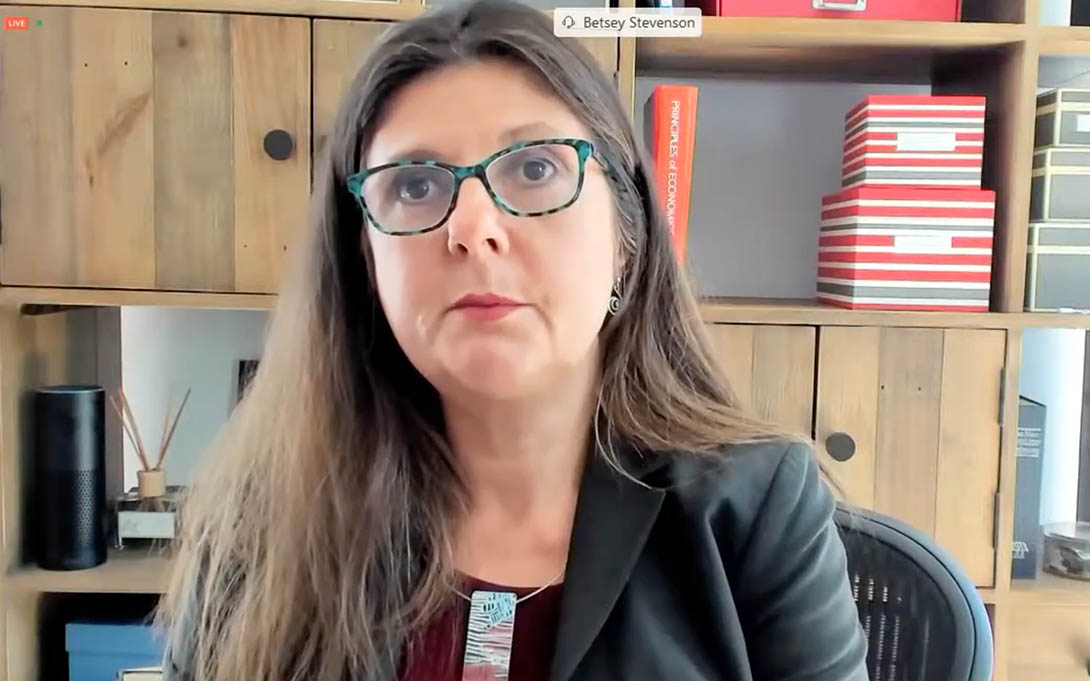
The Ford School's economics professor Betsey Stevenson has been discussing her views about the state of the economy to a wide variety of news outlets. Stevenson has looked at tariff increases, the Fed's response to government actions, worker wages, and the labor market. Below are some of Stevenson's recent comments.
“How rising costs on imports from Canada, Mexico & China will affect Metro Detroiters” WXYZ, January 31, 2025 - Stevenson spoke with WXYZ and shared some of her expectations for President Trump's promised tariff increases. She stated, "And it’s not just consumers but also businesses that might be making those purchases [tariff increases]... Companies are going to have to rethink how they manufacture things and what it’s going to look like if it needs to cross a border because you’re going to have to take a quarter of the value and send it off to the government." Stevenson urged that we can assume price increases now that "every time it [a product] crosses that border we got to add 25 percent to the price."
“The Federal Reserve Faces Its First Test in New Trump Era” Bloomberg, January 29, 2025 - Speaking with Bloomberg, Stevenson addressed potential actions from the Federal Reserve as a response the the new administration's decisions. “We have an independent central bank and one of the things the independent central bank is supposed to do is keep the economy operating sort of right at potential. When the federal government is making a lot of radical decisions, it could end up spiking inflation or causing a recession. I think that there is a lot of uncertainty right now, you know a lot of the cuts that President Trump is attempting to make, those could be weakening the economy, which would be a reason to cut rates.” Stevenson also commented on the surprisingly short impacts tariffs will likely have on the American economy. She claimed, “Tariffs will cause us to have a surge of inflation, prices will go up, and then we will just be living in our new world with high prices and high tariffs. That’s not going to cause ongoing inflation."
“Five years after the pandemic began, the job market is off the roller coaster” Marketplace, January 23, 2025 - While discussing the economic state of the United States, Betsey Stevenson also highlighted areas of positivity and growth. Stevenson suggested that the pandemic caused the U.S. to rebuild and rethink economics, leading to a somewhat flourishing economic recovery. “Unemployment insurance payments, the moratorium on having to pay your student loans, stimulus checks — all of that gave people some financial freedom to pursue new skills." She added, “It actually gives me a lot of hope for the future." Stevenson affirmed that the U.S. came out of the pandemic stronger. “We ended up with the most dynamic labor market among developed countries... We’ve seen real wage growth, [gross domestic product] growth, high labor-force participation.”
“Wages keep outpacing inflation as workers “do more with less” Marketplace, January 21, 2025 - Continuing her sentiments about the flexibility of the U.S. economy to be productive amidst the negative implications of the pandemic, Stevenson told Marketplace, “Real wage growth has to come from productivity growth. Because we’re doing more with less, we get more in the end." She insisted "that’s been the miracle of the U.S. economy. Americans don’t realize how much other countries coming out of the pandemic have had productivity slowdowns, and therefore have had real wage declines."
“7 charts that explain why Americans are unhappy with the economy” The Washington Post, January 20, 2025 - The American economy remains unfavorable in some aspects. Stevenson told The Washington Post that "child-care costs may fall into the category of prices that have an outsize impact on people feeling crunched." She added, "Food and gas inflation also tend to frustrate people in this way."
